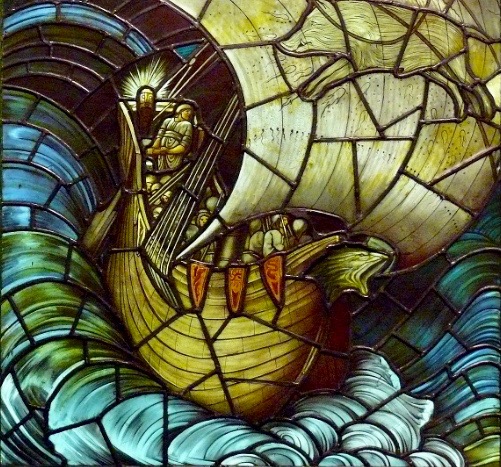A Man must stand by his Master Till one of the two is dead ...

This poem expresses the sense of loyalty at its utmost and is part and parcel of Kipling’s story ‘The Conversion of St. Wilfrid’. In that story, the saint is on the verge of converting a local chieftain from the worship of Odin (Wotan) and Thor (god of the thunder) to Christianity.
Then the saint and chieftain go out fishing and are shipwrecked on a small island. They would have perished if it were not for the chieftain’s pet seal, that swims ashore and manages to communicate to the chieftain’s men that they must go out to save him. The men ship out in the worst conditions possible – “It’s ebb, it’s dusk, it’s blowing – the shoals are a mile of white“, and feeling that “our master is angry with Odin ‑ Odin is angry with us! ” Yet there is no doubt in their minds that they must rescue him, or perish in the attempt.
The illustration is of a stained glass window by Edward Burne-Jones, Kipling’s uncle and friend.
Song of the Red War-Boat
Shove off from the wharf-edge! Steady! Watch for a smooth! Give way! (1) If she feels the lop already (2) She'll stand on her head in the bay. It's ebb - it's dusk - it's blowing - The shoals are a mile of white, But (snatch her along!) we're going To find our master to-night. For we hold that in all disaster Of shipwreck, storm, or sword, A Man must stand by his Master When once he has pledged his word. Raging seas have we rowed in But we seldom saw them thus, Our master is angry with Odin - Odin is angry with us! Heavy odds have we taken, But never before such odds. The Gods know they are forsaken. We must risk the wrath of the Gods! Over the crest she flies from, Into its hollow she drops, Cringes and clears her eyes from (3) The wind-torn breaker-tops, Ere out on the shrieking shoulder Of a hill-high surge she drives. Meet her! Meet her and hold her! (4) Pull for your scoundrel lives! The thunders bellow and clamour The harm that they mean to do! There goes Thor's own Hammer Cracking the dark in two! Close! But the blow has missed her, Here comes the wind of the blow! Row or the squall'll twist her Broadside on to it! - Row! Hearken, Thor of the Thunder! We are not here for a jest - For wager, warfare, or plunder, Or to put your power to test. This work is none of our wishing - We would house at home if we might - But our master is wrecked out fishing. We go to find him to-night. For we hold that in all disaster - As the Gods Themselves have said - A Man must stand by his Master Till one of the two is dead. This is our way of thinking, Now you can do what you will, While we try to save her from sinking And hold her head to it still. Bale her and keep her moving,(5) Or she'll break her back in the trough . . . Who said the weather's improving, Or the swells are taking off? . . . . Sodden, and chafed and aching, Gone in the loins and knees - No matter - the day is breaking, And there's far less weight to the seas! Up mast, and finish baling - In oars, and out with the mead - The rest will be two-reef sailing . . . (6) That was a night indeed! But we hold that in all disaster (And faith, we have found it true!) If only you stand by your Master, The Gods will stand by you!
Notes
[1] ‘A smooth’ – a lull in the breakers, when they can get out to sea; ‘Give way!’ – row away! (The helmsman, who is the narrator of the poem, shouting commands to the crew.)
[2] ‘The lop’ – short and lumpy waves.
[3] In many countries, eyes are painted on the bow to let the boat “see” her way.
[4] To get out to sea the boat must move straight against the wind and waves, so that the men cannot use the sail and must row. They must “meet” each breaker head-on and “hold” this course to avoid being turned broadside and swamped.
[5] ‘Bale’ – bail.
[6] ‘Two-reef sailing’ – still a stiff breeze, but manageable; the sail must be reefed (shortened) by two sections, the maximum being three or four.
